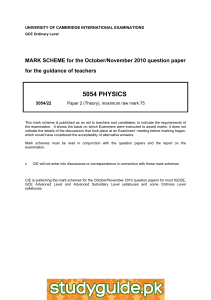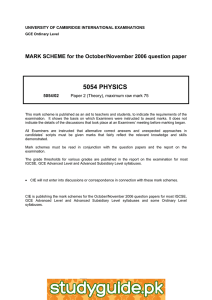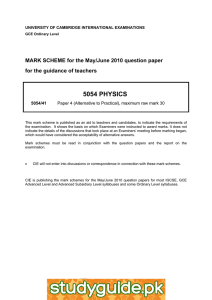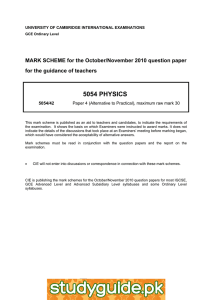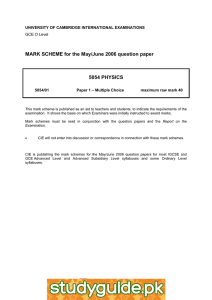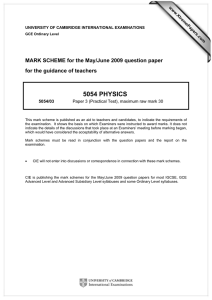5054 PHYSICS MARK SCHEME for the October/November 2010 question paper
advertisement
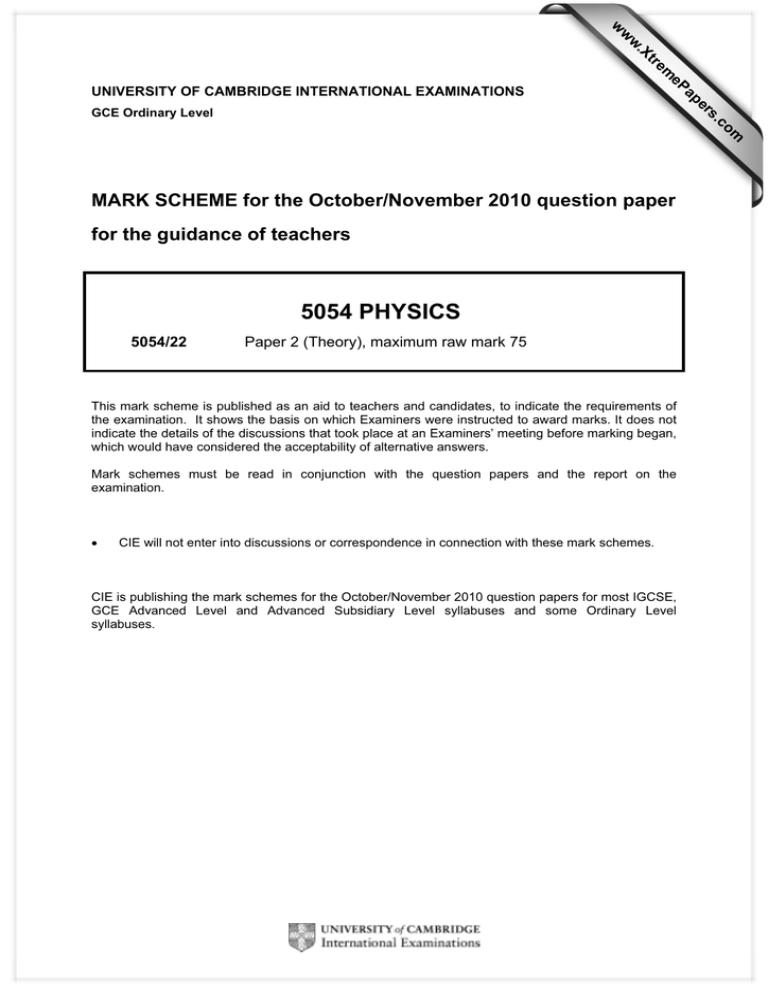
w
w
ap
eP
m
e
tr
.X
w
UNIVERSITY OF CAMBRIDGE INTERNATIONAL EXAMINATIONS
s
er
om
.c
GCE Ordinary Level
MARK SCHEME for the October/November 2010 question paper
for the guidance of teachers
5054 PHYSICS
5054/22
Paper 2 (Theory), maximum raw mark 75
This mark scheme is published as an aid to teachers and candidates, to indicate the requirements of
the examination. It shows the basis on which Examiners were instructed to award marks. It does not
indicate the details of the discussions that took place at an Examiners’ meeting before marking began,
which would have considered the acceptability of alternative answers.
Mark schemes must be read in conjunction with the question papers and the report on the
examination.
•
CIE will not enter into discussions or correspondence in connection with these mark schemes.
CIE is publishing the mark schemes for the October/November 2010 question papers for most IGCSE,
GCE Advanced Level and Advanced Subsidiary Level syllabuses and some Ordinary Level
syllabuses.
Page 2
Mark Scheme: Teachers’ version
GCE O LEVEL – October/November 2010
Syllabus
5054
Paper
22
Section A
1
(a) velocity has a direction/is a vector or speed does not have a direction/is not a vector
or displacement/time and distance/time
(ign speed is a scalar)
B1
(b)
2
(i) (–) 47 m/s
B1
(ii) (a =) v/t or 47/0.0013
(–) 3.6(1538 etc.) × 104 m/s2
C1
A1
(iii) (F =) ma or 0.16 × 3.6 × 104
(–) 5.8(or 5.78461 etc.) × 103 N
C1
A1
(a) any two points:
depth/height;
density (of liquid);
atmospheric pressure;
g/gravitational field strength/acceleration of free-fall (not gravity)
B2
(b) (i) (m =) ρV or 5.0 × 10–4 × 0.066 × 1000 or 3.3 × 10–5 × 1000
0.033 kg
(not factor of 10 caused by omitted density)
C1
A1
(ii) mass of oil = 0.033 (kg)/mass of water above X
or 1000 × 0.066/0.075 or 0.033/(5.0 × 10–4 × 0.075)
or 0.033/(3.75 × 10–5) or inversely proportional to height
880 kg/m3
3
(a)
C1
A1
(i) (M =) force × perpendicular distance or 840 × 5
(formula mark can be scored if not given in 3(a)(ii))
4200 N m
C1
A1
(ii) 350 N or (a)(i)/12 and calculated
B1
(iii) weight of ladder/hose or friction at P/pivot/axle
(not air resistance; ign. friction)
B1
(b) any four lines:
(mesh) traps air
air poor conductor/good insulator or convection prevented
(shiny surface) reflects/(good) reflector of IR/radiation/heat
(shiny surface) does not absorb/poor absorber of IR/radiation/heat
(not with radiator/emitter/conductor)
less heat transmitted/to firefighter
© UCLES 2010
B4
[6]
[6]
[8]
Page 3
4
Mark Scheme: Teachers’ version
GCE O LEVEL – October/November 2010
Syllabus
5054
(a) (R =) V/I or 230/12
19/19.2/19.1 Ω etc.
C1
A1
(b) (resistance) increases
as the temperature increases/gets hotter/gets heated
B1
B1
(c) (if switched on suddenly) low R → high/excess current
or it prevents high/excess current
bulb/filament/fuse blown/damaged
or wires damaged (ign lamp/filament lamp damaged)
5
6
7
Paper
22
B1
B1
(a) 0.80 or 0.0008 or 4 × 0.20 or 4 × 0.0002 or 4 divisions
(f =) 1/T or 1.2/1.25/1.3 (Hz)
1200/1250/1300 Hz
C1
C1
A1
(b) any three of:
equal/same pitch/frequency
original note louder/ S quieter/softer
{ different qualities/timbres/
{ more frequencies/overtones/harmonics in S
B3
(ign wavelength)
(ign amplitude)
(a) remain stationary/no effect/unaffected
[6]
B1
(b) lifted up/attracted/stick to rod
fall down/return to dish
(stated not implied)
B1
B1
(c) lifted up/attracted/stick to rod
stay up/remain attracted
(stated not implied)
B1
B1
(a) any two of:
ionising or nuclear or α, β and γ (radiation)
always present/inescapable/in the environment/air/atmosphere/surroundings/
cosmic (radiation) or radiation from Sun/space/Earth/rocks
B2
(b) named activity:
nuclear tests
nuclear power
water leaks traced
radioactive ore mining
smoke detector
specific industrial use
(nuclear) medicine
A1
M1
[6]
how activity produces increase:
fallout/radioisotopes spread
disposal of nuclear waste
disposal of radioisotopes/absorption of radiation
isotopes exposed
disposal of radioisotopes
disposal of radioisotopes
disposal of radioisotopes/absorption of radiation
© UCLES 2010
[5]
[4]
Page 4
8
Mark Scheme: Teachers’ version
GCE O LEVEL – October/November 2010
Syllabus
5054
gravitational collapse (of hydrogen cloud) or gravity pulls cloud together
or loss of GPE
temperature increase or gain of KE
fusion (of hydrogen) or hydrogen to helium
energy released or exothermic or equilibrium or pressure cancels collapse
or pressure increase (not density increase)
Paper
22
B1
B1
B1
B1
[4]
Section B
9
(a)
(i) one correctly reflected ray (by eye)
B1
(ii) two reflected rays traced back to an image
(labelled) image in correct position (by eye)
B1
B1
(iii) any two of:
virtual
full size/mag = 1 or same distance from mirror as C
laterally inverted
(ign upright)
dimmer
B2
(iv) more comfortable/no neck strain/no need to look up/reflects to eyes
B1
(b) (i) (c =) 3(.00) × 108 (m/s) or 3(.00) × 105 (km/s) or used in equation
(f =) c/λ or (3.0 × 108/their stated value/330)/4.0 × 10–7
7.5 × 1014 Hz or correct answer from stated value (incl. unit)
or 8.2/8.25/8.3 × 108 Hz
(ii) any two:
UV(radiation);
X(radiation);
γ(radiation)
[6]
B1
C1
A1
B2
(iii) 1.
UV absorbed by skin
psoriasis destroyed
cells multiply less rapidly
X-rays absorbed by
bones/not absorbed by
flesh
shadow/image of bones
on film/CCD
γ-rays emitted by
absorbed isotope
position/shape of organ
etc. revealed
on film/CCD
tumour/cancer absorbs
X/γ-ray
tumour destroyed
photons/energy/stops
cells multiplying
bacteria absorb
UV/X/γ-ray
Bacteria killed
sterilisation/stops
bacteria multiplying
2.
UV:
X-rays:
γ-ray:
damages eyes/skin
cancer
cancer/hair loss/
radiation sickness
cancer/hair loss/
radiation sickness
© UCLES 2010
B1
[9]
Page 5
10 (a)
Mark Scheme: Teachers’ version
GCE O LEVEL – October/November 2010
Syllabus
5054
(i) 32 000 N
B1
(ii) two arrows/lines in correct direction by eye
B1
(iii) scale given
two arrows/lines and correct resultant drawn
32.0 → 35.0 kN
(2/3 sig. fig. only)
58.5 → 61.5° to horizontal
(2/3 sig. fig. only; don’t penalise twice)
B1
B1
B1
(iv) zero/no force/0
B1
[7]
B1
B1
B1
B1
[4]
B1
(b) weight/gravitational force/gravitational attraction
(not gravity)
higher in gravitational field or (to gravitational) potential energy
friction/air resistance
heat/thermal/internal energy
(c)
(i) labelled axes and correct way round (x → t)
straight line of positive slope
followed only by horizontal line
(ign curve at junction)
(ii) distance travelled/time taken (from points) or calculate the gradient
11 (a) energy released/unit charge or power released/unit current
18 J/C or 18 W/A
(b) (i) (t =) 5400 or 60 × 90 or 1.5 or 90/60 or (E =) Pt or 450 × 90
450 × 60 × 90 or 450 × 5400 or 4.0/4.05/4.1 × 104 or 0.45 × 1.5
or 0.45 × 90/60 or 450 × 1.5 or 450 × 90/60
2.4(3) × 106 J or 0.675 kWh
(ii) (Q =) E/emf (ign. emf = E/Q) OR
or 2.4(3) × 106/18
1.3/1.35/1.4 × 105 C
(c)
Paper
22
(I =) 25 (A) or 25 × 5400
or 25 × 60 × 90
(i) laminated/iron core
two coils on core
(ii) turns ratio = 10:1
B1
B1
B1
B1
[4]
C1
A1
[2]
B1
C1
A1
C1
A1
[5]
B1
B1
(may be shown on diagram)
(iii) diode symbol
symbol for battery/cell (allow either polarity w.r.t. diode) and complete circuit
© UCLES 2010
B1
B1
B1
[5]
Page 6
Mark Scheme: Teachers’ version
GCE O LEVEL – October/November 2010
(d) can be transformed/operate transformer/voltage can be changed
high voltage/low current transmission (possible)
or changing magnetic field
less energy/power loss or less heating (in wires) or thinner wires
Syllabus
5054
Paper
22
B1
B1
B1
[3]
MARKING SCHEME CODE:
B1
C1
Independent Mark
Compensation Mark:
awarded automatically if the answer is correct. i.e. the working need not be seen if the
answer is correct; also given if the answer is wrong but the point is seen in the working.
M1
(Compulsory) Method Mark:
if not awarded subsequent A marks are lost (up to next B, M or C mark).
A1
Answer Mark.
c.a.o. correct answer only (including unit)
e.e.o.o. each error or omission
e.c.f.
error carried forward:
it is usually awarded even where not specifically indicated.
i.e. subsequent working including a previous error is credited, if otherwise correct.
Incorrect units, errors in powers of 10 (except where the power of 10 comes from g = 10
N/kg) and unit multipliers are to be treated as arithmetical errors.
Correct numerical answers with incorrect units will normally gain preceding C marks even
when the working is not shown.
Do not penalise a sig. fig. /fraction or a unit error more than once in the same question.
Sig. fig. Answers must given to 2 or more sig. fig. except where the answer is exactly 0.6, 2 etc.
Answers given to 2 or 3 sig. fig. must be correctly rounded – but a 5 can produce a rounding
up or down.
© UCLES 2010
